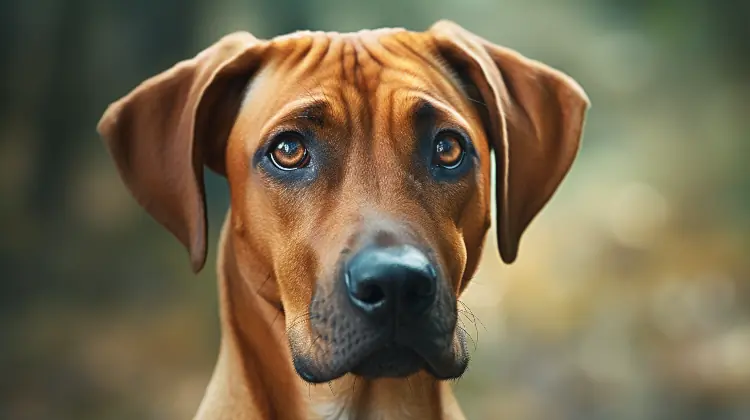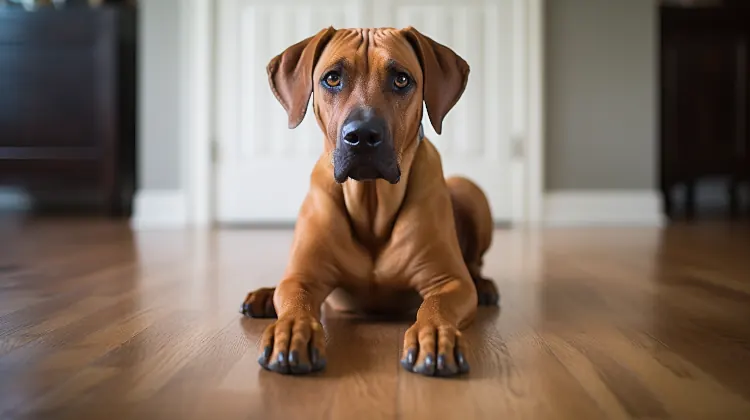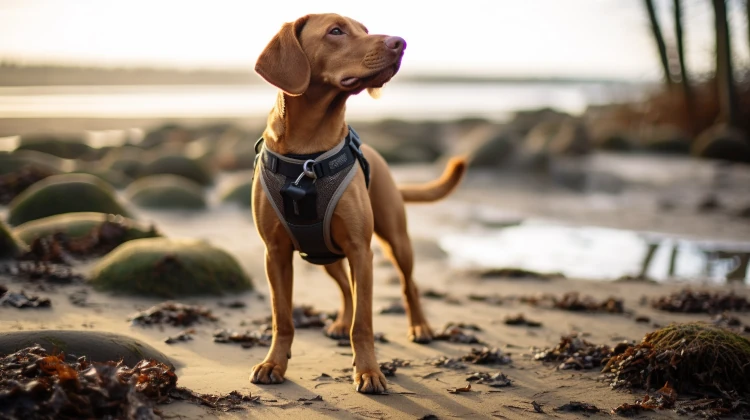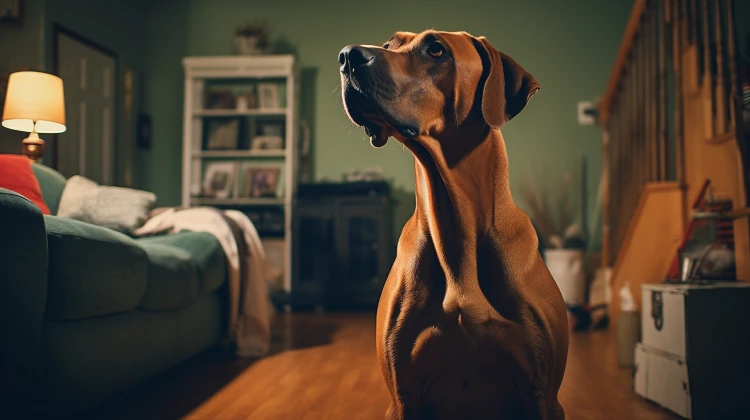Owning a Rhodesian Ridgeback can be both rewarding and challenging, especially when it comes to understanding their unique health issues. As a breed known for its resilience, these dogs still face several common health concerns, such as hip dysplasia and dermoid sinus.
This article will look at these issues in-depth and provide prevention strategies and care tips to maintain your Ridgeback’s health. Intrigued? Let’s uncover what lies beneath the ridge of this beautiful breed!
Table of contents
Key Takeaways
- Rhodesian Ridgebacks are prone to several common health problems, including hip dysplasia, dermoid sinuses, autoimmune thyroiditis, early onset adult deafness (EOAD), and eye abnormalities.
- Regular check-ups and screenings with a veterinarian are essential for the early detection and treatment of these health issues.
- Proper nutrition, regular exercise, genetic testing, responsible breeding practices, and proactive care can help maintain the overall health and well-being of Rhodesian Ridgebacks.
Common Health Problems of the Rhodesian Ridgeback

The Rhodesian Ridgeback is prone to several common health problems, including hip dysplasia, dermoid sinuses, autoimmune thyroiditis, early onset adult deafness (EOAD), and eye abnormalities.
Hip Dysplasia
Hip dysplasia is arguably one of the most prevalent health problems in Rhodesian Ridgebacks. This condition occurs due to a malformation in the hip joint, often leading to arthritis or lameness, especially as your beloved pet ages.
While dogs of any age can be affected, symptoms usually appear when they’re young adults between 1 and 2 years old. Large-breed dogs like Rhodesian Ridgebacks are particularly susceptible because of their rapid growth rates.
Early detection through regular veterinary check-ups is crucial to keep your dog happy and healthy. Treatment can range from medication for pain management to surgery in severe cases.
Furthermore, responsible breeders should have their puppies tested and treated for potential issues like this before rehoming them, assisting significantly in maintaining the overall health integrity of this popular breed.
Dermoid Sinuses
The Rhodesian Ridgeback breed can be predisposed to a unique health issue known as Dermoid Sinuses. This hereditary skin condition is characterized by tubular indentations, or sinuses, which occur along the dog’s back at birth and could extend as deep as the spinal canal.
These abnormal tubes may connect to the skin surface with an opening that discharges pus or other secretions. It’s common in many purebred dogs, including Rhodesian Ridgebacks, who are usually born with a dermoid sinus.
If left untreated, these sinuses can lead to severe infections impacting your dog’s overall health and quality of life. The most effective treatment for dermoid sinuses involves surgical removal by a skilled veterinarian.
However, this surgery may be intricate if the sinus extends toward the spinal cord region. Keep your Rhodesian Ridgeback happy and healthy by ensuring regular vet check-ups for early detection of potential issues like Dermoid Sinus and timely treatment.
Autoimmune Thyroiditis
Autoimmune Thyroiditis, also known as hypothyroidism, is a prevalent health concern among Rhodesian Ridgebacks. The breed has a genetic predisposition to this condition where the immune system attacks the thyroid gland and disrupts normal hormone production.
Vital for metabolism regulation and maintaining optimum energy levels, when these hormones fall short, symptoms like weight gain, lethargy, and skin and coat problems often manifest in your dog.
Regular vet check-ups can track low thyroid levels once a year, allowing for early detection and treatment. While autoimmune thyroiditis does require lifelong management with medication from your vet’s office or pet health insurance coverage, it doesn’t necessarily limit your Ridgeback’s happy and healthy life if properly managed.
Early Onset Adult Deafness (EOAD)/Congenital Deafness
One common health issue that can affect Rhodesian Ridgebacks is early onset adult deafness, also known as congenital deafness. This condition can occur in the breed and is characterized by a loss of hearing either from birth or at an early age.
It is believed to be hereditary and can be caused by genetic factors. While it may present challenges for the dog and the owner, there are ways to accommodate and care for a deaf Rhodesian Ridgeback.
Training using visual cues and hand signals can be effective methods of communication, ensuring the dog still understands commands and directions. It’s important for owners to be aware of this potential issue when considering adding a Rhodesian Ridgeback to their family and to provide appropriate care for their furry friend if they are affected by congenital deafness.
Eye Abnormalities
Eye abnormalities are another common health concern in Rhodesian Ridgebacks. Some eye conditions this breed is prone to include cataracts, progressive retinal atrophy (PRA), and entropion.
Cataracts are cloudy areas on the eye’s lens, while PRA is a degenerative condition that leads to vision loss over time. Entropion is when the eyelid rolls inward, causing irritation and potential damage to the cornea.
Regular eye examinations by a veterinarian are important for the early detection and treatment of these issues to ensure your Rhodesian Ridgeback maintains good vision throughout life.
Prevention and Care for Health Issues

Regular check-ups and screenings are essential to prevent and care for health issues in Rhodesian Ridgebacks. Proper nutrition and exercise should be provided to keep them healthy.
Early detection and treatment of potential issues are crucial, along with genetic testing and responsible breeding practices to minimize the risk of inherited health conditions.
Regular check-ups and screenings
Regular check-ups and screenings are essential for maintaining the health of your Rhodesian Ridgeback. By taking your dog to the vet on a regular basis, you can catch any potential health issues early and ensure that they receive proper treatment.
Regular check-ups allow veterinarians to monitor your dog’s overall health and well-being and detect any signs of common health problems like hip dysplasia, dermoid sinuses, autoimmune thyroiditis, early onset adult deafness, or eye abnormalities.
Additionally, screenings such as blood tests can help identify any underlying conditions that may not be immediately apparent. By staying proactive with your Rhodesian Ridgeback’s healthcare needs through regular check-ups and screenings, you can help ensure they live a happy and healthy life.
Proper nutrition and exercise
A healthy diet and regular exercise are essential for keeping your Rhodesian Ridgeback healthy. A balanced and nutritious diet that meets their needs is important to support their overall well-being.
Consult with your veterinarian or a canine nutritionist to determine the best diet plan for your Ridgeback, taking into consideration factors such as age, activity level, and any underlying health conditions they may have.
Regular exercise and proper nutrition are vital for keeping your Ridgeback physically fit and mentally stimulated. This active breed requires daily exercise to prevent obesity and maintain strong muscles and joints.
Early detection and treatment
Early detection and treatment are crucial when it comes to addressing the common health problems that Rhodesian Ridgebacks may face. Regular check-ups and screenings with your veterinarian can help identify potential issues before they become more serious.
Being proactive in monitoring your dog’s health is important, as early intervention can often lead to better outcomes. If your Rhodesian Ridgeback shows any signs of a health problem, such as lameness or changes in behavior, it is important to seek veterinary care promptly.
By being vigilant and addressing potential health concerns early on, you can help keep your beloved Rhodesian Ridgeback happy and healthy for years to come.
Genetic testing and responsible breeding
Genetic testing and responsible breeding play a crucial role in ensuring the overall health and well-being of Rhodesian Ridgebacks. By conducting genetic tests, breeders can identify any inherited health issues that may be present in the bloodline and make informed decisions about breeding pairs.
This helps to reduce the risk of passing genetic conditions to future generations. Responsible breeders prioritize the health of their dogs over appearance or other factors, making sure to only breed dogs with good genetic health and clear test results.
This helps minimize common health problems such as hip dysplasia, dermoid sinuses, autoimmune thyroiditis, and deafness in Rhodesian Ridgebacks. It’s important for dog lovers to seek reputable breeders who prioritize genetic testing and responsible breeding practices when looking for a healthy puppy.
Additional Health Concerns

– Allergies, dental disease, obesity, parasites, and bone and joint problems are also common health concerns for Rhodesian Ridgebacks. Read on to learn more about preventing and caring for these issues.
Allergies
Allergies can be a common health concern for Rhodesian Ridgebacks. They may develop allergies to certain foods, environmental factors like pollen, dust mites, or flea bites.
Signs of allergies in dogs can include itching, scratching, redness, and skin irritations. Some allergies may also cause gastrointestinal issues such as diarrhea or vomiting.
If you suspect your Rhodesian Ridgeback has allergies, working closely with your veterinarian to identify the allergen and develop a management plan is important. This may involve dietary changes, medication for symptom relief, allergy testing, and immunotherapy for long-term control.
Dental Disease
Dental disease is another common health concern for Rhodesian Ridgebacks. Like humans, dogs can also suffer from dental issues such as gum disease, cavities, and tooth decay. Poor oral hygiene can lead to a buildup of plaque and tartar, which can eventually cause inflammation of the gums (gingivitis) and even infections in the mouth.
It is important for dog owners to take good care of their Ridgeback’s teeth by regularly brushing them and providing appropriate chew toys or dental treats to help clean their teeth naturally.
Regular veterinary check-ups should also include examining the dog’s oral health to catch any potential dental problems early on.
Obesity
Obesity is a common health concern for Rhodesian Ridgebacks, as it is for many dog breeds. These dogs are prone to weight gain without proper exercise and nutrition. It is important to keep your Rhodesian Ridgeback at a healthy weight to prevent strain on their joints and decrease the risk of other health issues like hip dysplasia.
Regular exercise, such as daily walks or playtime, and a balanced diet will help keep your dog happy and healthy. Be mindful of portion sizes and avoid excessive treats or human food, as these can contribute to weight gain.
Parasites
Parasites can threaten the health of Rhodesian Ridgebacks, as with any other breed. These parasites can include fleas, ticks, and worms such as roundworms and heartworms. Regular preventative measures, such as flea and tick treatments and regular deworming, are essential in keeping your Ridgeback healthy.
Fleas and ticks can carry diseases that can cause severe discomfort and even transmit infections to your dog. Heartworms can be life-threatening if left untreated. By staying vigilant with preventive medications recommended by your veterinarian, you can help protect your beloved pet from these pesky parasites.
Bone and Joint Problems
Bone and joint problems are common health concerns in Rhodesian Ridgebacks. Hip dysplasia, elbow dysplasia, and arthritis are among the issues that can affect these dogs. Hip dysplasia occurs when the hip joint doesn’t form properly, leading to lameness and pain.
Elbow dysplasia is a condition where the elbow joint develops abnormally, causing limping and discomfort. Arthritis can develop over time as the dog ages or due to previous joint injuries.
These bone and joint problems can be managed with proper care, including regular exercise to keep the joints strong and maintaining a healthy weight to reduce stress on the bones. Veterinary treatment may also be necessary for severe cases to relieve pain and improve mobility.
Conclusion
In conclusion, it’s important for Rhodesian Ridgeback owners to be aware of the common health problems that can affect this breed. Regular check-ups, proper nutrition and exercise, early detection and treatment, genetic testing, and responsible breeding can all contribute to keeping a Rhodesian Ridgeback happy and healthy.
Owners can ensure their furry friends live long and vibrant lives by staying informed and proactive about their dog’s health.
FAQs
Some common health problems that can affect Rhodesian Ridgebacks include hip dysplasia, dermoid sinus, hypothyroidism, and bloat.
Some common health problems that can affect Rhodesian Ridgebacks include hip dysplasia, dermoid sinus, hypothyroidism, and bloat.
Dermoid sinus is a congenital condition where a small tube or tunnel forms under the skin along the ridge of the back. Treatment usually involves surgical removal of the sinus to prevent infection or other complications.
Bloat is a potentially life-threatening emergency that requires immediate veterinary attention. Symptoms may include restlessness, pacing, unsuccessful attempts to vomit, distended abdomen, panting excessively, and signs of discomfort or pain.





